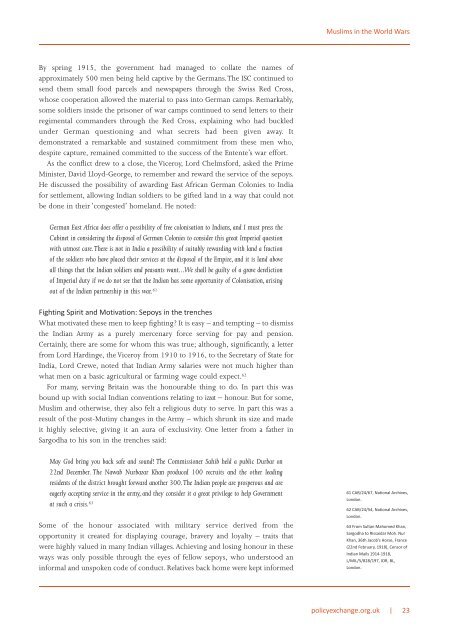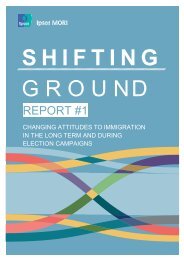Create successful ePaper yourself
Turn your PDF publications into a flip-book with our unique Google optimized e-Paper software.
By spring 1915, the government had managed to collate the names of<br />
approximately 500 men being held captive by the Germans. The ISC continued to<br />
send them small food parcels and newspapers through the Swiss Red Cross,<br />
whose cooperation allowed the material to pass into German camps. Remarkably,<br />
some soldiers inside the prisoner of war camps continued to send letters to their<br />
regimental commanders through the Red Cross, explaining who had buckled<br />
under German questioning and what secrets had been given away. It<br />
demonstrated a remarkable and sustained commitment from these men who,<br />
despite capture, remained committed to the success of the Entente’s war effort.<br />
As the conflict drew to a close, the Viceroy, Lord Chelmsford, asked the Prime<br />
Minister, David Lloyd-George, to remember and reward the service of the <strong>sep</strong>oys.<br />
He discussed the possibility of awarding East African German Colonies to India<br />
for settlement, allowing Indian soldiers to be gifted land in a way <strong>that</strong> could not<br />
be done in their ‘congested’ homeland. He noted:<br />
German East Africa does offer a possibility of free colonisation to Indians, and I must press the<br />
Cabinet in considering the disposal of German Colonies to consider this great Imperial question<br />
with utmost care. There is not in India a possibility of suitably rewarding with land a fraction<br />
of the soldiers who have placed their services at the disposal of the Empire, and it is land above<br />
all things <strong>that</strong> the Indian soldiers and peasants want...We shall be guilty of a grave dereliction<br />
of Imperial duty if we do not see <strong>that</strong> the Indian has some opportunity of Colonisation, arising<br />
out of the Indian partnership in this war. 61<br />
Fighting Spirit and Motivation: Sepoys in the trenches<br />
What motivated these men to keep fighting? It is easy – and tempting – to dismiss<br />
the Indian Army as a purely mercenary force serving for pay and pension.<br />
Certainly, there are some for whom this was true; although, significantly, a letter<br />
from Lord Hardinge, the Viceroy from 1910 to 1916, to the Secretary of State for<br />
India, Lord Crewe, noted <strong>that</strong> Indian Army salaries were not much higher than<br />
what men on a basic agricultural or farming wage could expect. 62<br />
For many, serving Britain was the honourable thing to do. In part this was<br />
bound up with social Indian conventions relating to izzat – honour. But for some,<br />
Muslim and otherwise, they also felt a religious duty to serve. In part this was a<br />
result of the post-Mutiny changes in the Army – which shrunk its size and made<br />
it highly selective, giving it an aura of exclusivity. One letter from a father in<br />
Sargodha to his son in the trenches said:<br />
May God bring you back safe and sound! The Commissioner Sahib held a public Durbar on<br />
22nd December. The Nawab Nurbazar Khan produced 100 recruits and the other leading<br />
residents of the district brought forward another 300. The Indian people are prosperous and are<br />
eagerly accepting service in the army, and they consider it a great privilege to help Government<br />
at such a crisis. 63<br />
Some of the honour associated with military service derived from the<br />
opportunity it created for displaying courage, bravery and loyalty – traits <strong>that</strong><br />
were highly valued in many Indian villages. Achieving and losing honour in these<br />
ways was only possible through the eyes of fellow <strong>sep</strong>oys, who understood an<br />
informal and unspoken code of conduct. Relatives back home were kept informed<br />
Muslims in the World Wars<br />
61 CAB/24/67, National Archives,<br />
London.<br />
62 CAB/24/54, National Archives,<br />
London.<br />
63 From Sultan Mahomed Khan,<br />
Sargodha to Rissaidar Moh. Nur<br />
Khan, 36th Jacob’s Horse, France<br />
(22nd February, 1918), Censor of<br />
Indian Mails 1914-1918,<br />
L/MIL/5/828/197, IOR, BL,<br />
London.<br />
policyexchange.org.uk | 23



